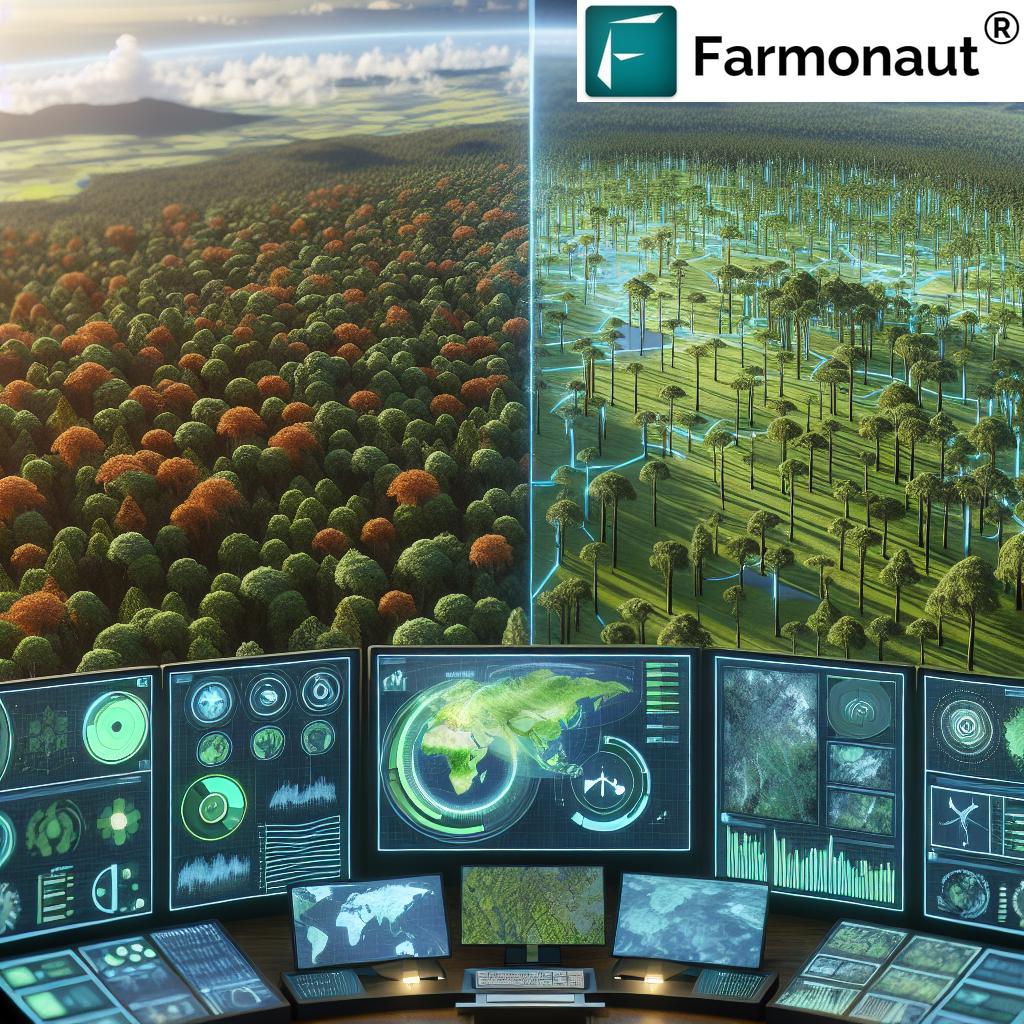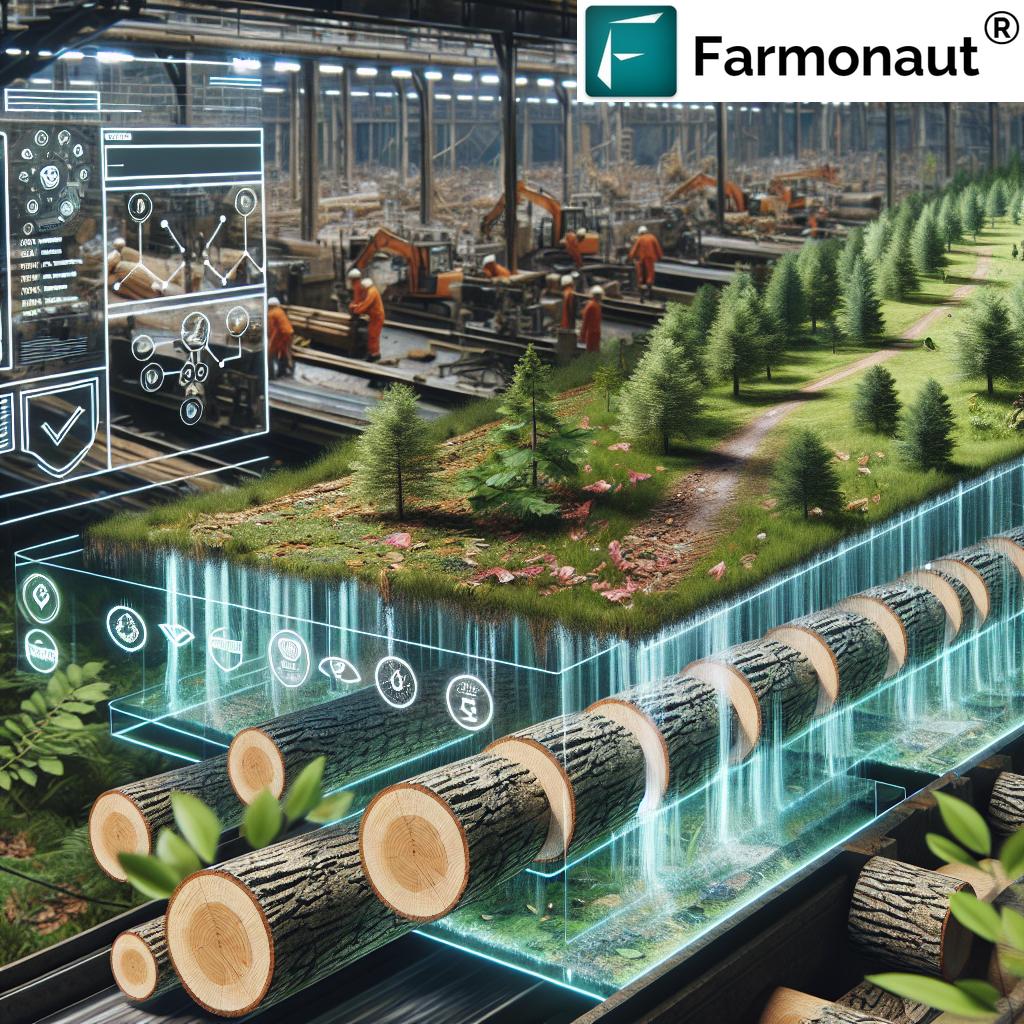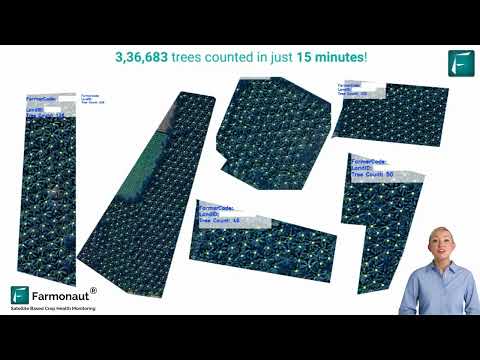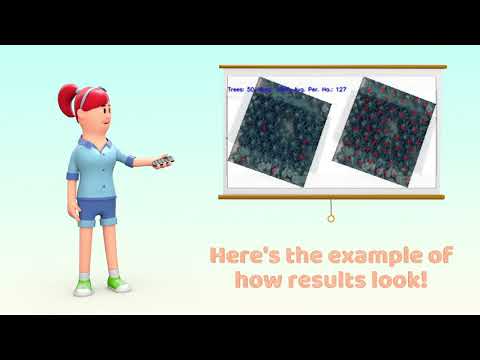EU Deforestation Regulation: Revolutionizing Sustainable Forestry Practices and Supply Chain Transparency
“The EU Deforestation Regulation impacts over 60% of global tropical deforestation linked to EU consumption.”
In the ever-evolving landscape of global environmental conservation, the EU Deforestation Regulation stands as a pivotal milestone in our collective journey towards sustainable forestry practices and enhanced supply chain transparency. As we at Farmonaut continue to innovate in the realm of agritech solutions, we recognize the profound impact this regulation will have on businesses worldwide, particularly in the forestry and agricultural sectors.
The implementation of the EU Deforestation Regulation marks a significant shift in how we approach forest conservation strategies and certification standards. It challenges us to reevaluate our relationship with our planet’s vital forest resources and pushes for a more responsible, transparent, and sustainable approach to forest management and wood product sourcing.

In this comprehensive exploration, we’ll delve into the intricacies of the EU Deforestation Regulation, its far-reaching implications, and the innovative solutions emerging to meet its challenges. From environmental impact assessments to the identification of high conservation value areas, we’ll examine how this regulation is reshaping the industry landscape.
Moreover, we’ll highlight how agritech solutions, including those offered by Farmonaut, are playing a crucial role in supporting sustainable wood products and palm oil sustainability. Our journey will take us through the evolving world of forest stewardship, emphasizing the importance of collaboration in addressing industry challenges.
Understanding the EU Deforestation Regulation
The EU Deforestation Regulation represents a groundbreaking initiative aimed at curbing global deforestation and forest degradation linked to EU consumption. At its core, this regulation seeks to ensure that products placed on the EU market or exported from it are not associated with deforestation or forest degradation.
- Scope: The regulation covers a wide range of commodities, including palm oil, soy, beef, wood, cocoa, and coffee, as well as derived products.
- Due Diligence: It mandates that companies conduct thorough due diligence to ensure their supply chains are deforestation-free.
- Traceability: A key aspect is the requirement for enhanced traceability of products back to their source.
- Penalties: Non-compliance can result in significant fines and market exclusion.
For businesses operating in or with the EU, adapting to these new requirements is not just a matter of compliance but a strategic imperative. The regulation is set to reshape global supply chains, pushing for greater transparency and sustainability across industries.
The Impact on Sustainable Forestry Practices
The EU Deforestation Regulation is poised to revolutionize sustainable forestry practices worldwide. By setting stringent standards for products entering the EU market, it creates a ripple effect that encourages better forest management practices globally.
- Enhanced Forest Conservation: The regulation incentivizes the protection of existing forests and the restoration of degraded areas.
- Improved Monitoring: It necessitates more robust systems for monitoring forest cover and land use changes.
- Sustainable Harvesting: Encourages the adoption of sustainable harvesting techniques to maintain forest health.
As a result, we’re witnessing a surge in demand for innovative solutions that can support these practices. This is where agritech solutions, like those provided by Farmonaut, come into play. Our satellite-based monitoring systems and AI-driven analytics offer invaluable tools for forest managers and businesses striving to meet these new standards.
Supply Chain Transparency: A New Era
One of the most significant impacts of the EU Deforestation Regulation is the unprecedented push for supply chain transparency. This requirement is transforming how businesses operate and interact with their suppliers.
- Traceability Systems: Companies are investing in advanced traceability systems to track products from source to shelf.
- Data Management: There’s a growing need for robust data management solutions to handle the increased information flow.
- Supplier Engagement: Businesses are deepening their engagement with suppliers to ensure compliance throughout the supply chain.
At Farmonaut, we understand the complexities of achieving this level of transparency. Our blockchain-based traceability solutions offer a secure and transparent way to track products through every stage of the supply chain, from forest to consumer.
Environmental Impact Assessments: A Critical Tool
Environmental impact assessments (EIAs) have become an indispensable tool in the quest for sustainable forestry. The EU Deforestation Regulation emphasizes the importance of these assessments in ensuring that forestry practices are environmentally sound.
- Comprehensive Evaluation: EIAs provide a holistic view of the potential environmental impacts of forestry activities.
- Risk Mitigation: They help identify potential risks and develop strategies to mitigate them.
- Stakeholder Engagement: EIAs often involve consultation with local communities and stakeholders, ensuring a more inclusive approach to forest management.
Farmonaut’s satellite imagery and AI-powered analytics contribute significantly to these assessments. Our technology allows for real-time monitoring of forest health, detection of land-use changes, and assessment of biodiversity impacts, all crucial components of a thorough EIA.
High Conservation Value Areas: Preserving Biodiversity
The concept of High Conservation Value (HCV) areas is central to modern sustainable forestry practices. These are areas of outstanding and critical importance due to their environmental, socioeconomic, biodiversity, or landscape values.
- Identification: The EU regulation emphasizes the need for accurate identification and protection of HCV areas.
- Management: Sustainable practices must be implemented to maintain or enhance the conservation values of these areas.
- Monitoring: Regular monitoring is essential to ensure the ongoing protection of HCV areas.
Farmonaut’s advanced satellite imagery and AI algorithms play a crucial role in identifying and monitoring HCV areas. Our technology can detect subtle changes in vegetation patterns, helping forest managers to quickly respond to potential threats to these valuable ecosystems.

Agritech Solutions for Deforestation: Farmonaut’s Approach
In the face of these new regulatory challenges, agritech solutions are emerging as powerful allies in the fight against deforestation. At Farmonaut, we’re at the forefront of this technological revolution, offering innovative tools to support sustainable forestry practices.
- Satellite Monitoring: Our satellite-based monitoring system provides real-time insights into forest health and land use changes.
- AI-Powered Analytics: Advanced algorithms analyze satellite data to detect early signs of deforestation or degradation.
- Blockchain Traceability: Our blockchain solutions ensure transparent and tamper-proof tracking of forest products through the supply chain.
- Mobile Applications: User-friendly mobile apps make it easy for forest managers to access critical data in the field.
These tools not only aid in compliance with the EU Deforestation Regulation but also contribute to more efficient and sustainable forest management practices overall.
Explore our solutions:
Sustainable Wood Products: Meeting New Standards
The EU Deforestation Regulation places a significant emphasis on ensuring the sustainability of wood products. This focus is driving innovation in the forestry sector and changing how we approach wood production and processing.
- Certification Standards: There’s an increased emphasis on robust certification standards for sustainable wood products.
- Resource Efficiency: The industry is exploring ways to maximize resource efficiency in wood processing.
- Alternative Materials: Research into sustainable alternatives to traditional wood products is gaining momentum.
Farmonaut’s technology supports these efforts by providing detailed insights into forest health and growth rates, enabling more precise and sustainable harvesting practices.
Palm Oil Sustainability: A Critical Focus
Palm oil, a commodity often associated with deforestation, is under particular scrutiny in the EU Deforestation Regulation. The push for palm oil sustainability is reshaping the industry and driving significant changes in production practices.
- Sustainable Cultivation: There’s a growing emphasis on sustainable palm oil cultivation techniques.
- Deforestation-Free Supply Chains: Companies are working to ensure their palm oil supply chains are completely deforestation-free.
- Community Engagement: Sustainable palm oil production increasingly involves engagement with local communities to ensure equitable development.
Farmonaut’s satellite monitoring and AI analytics are valuable tools in this context, helping palm oil producers monitor their plantations, detect illegal deforestation, and demonstrate compliance with sustainability standards.
“Sustainable forestry practices can reduce carbon emissions by up to 31% in the forest products industry.”
Forest Stewardship Certification: Evolving Standards
Forest stewardship certification plays a crucial role in promoting sustainable forestry practices. The EU Deforestation Regulation is driving the evolution of these certification standards, making them more robust and comprehensive.
- Enhanced Criteria: Certification bodies are updating their criteria to align with the new regulation.
- Technological Integration: There’s a growing trend towards integrating technology into the certification process for more accurate assessments.
- Chain of Custody: Increased focus on ensuring a transparent and traceable chain of custody for certified products.
At Farmonaut, we’re working on integrating our satellite monitoring and blockchain traceability solutions with existing certification processes, making it easier for forest managers to demonstrate compliance and maintain their certifications.
Collaboration in Addressing Industry Challenges
The scale and complexity of the challenges posed by the EU Deforestation Regulation necessitate unprecedented levels of collaboration across the industry. We’re seeing new partnerships and initiatives emerging to address these challenges collectively.
- Multi-Stakeholder Initiatives: Collaborations between businesses, NGOs, and governments are becoming more common.
- Technology Sharing: There’s a growing trend towards sharing technological solutions and best practices across the industry.
- Research Partnerships: Increased collaboration between industry and academia to develop innovative solutions.
Farmonaut is committed to fostering this spirit of collaboration. We actively engage with industry partners, research institutions, and regulatory bodies to ensure our solutions are aligned with the latest standards and best serve the needs of the forestry sector.
The Role of Governments and Institutions
The success of the EU Deforestation Regulation hinges on the active involvement of governments and institutions worldwide. Their role is crucial in creating an enabling environment for sustainable forestry practices.
- Policy Alignment: Many countries are aligning their national policies with the EU regulation to ensure smooth trade relations.
- Capacity Building: Governments are investing in capacity building to help local industries adapt to the new requirements.
- International Cooperation: Enhanced cooperation between governments to address transboundary issues related to deforestation.
Farmonaut works closely with government agencies and institutions, providing them with the technological tools and data they need to monitor forest resources effectively and enforce sustainable practices.
Future Trends and Opportunities
As the industry adapts to the EU Deforestation Regulation, we’re witnessing the emergence of new trends and opportunities in sustainable forestry:
- AI and Machine Learning: Advanced AI applications for more accurate forest monitoring and predictive analytics.
- Drone Technology: Integration of drone technology with satellite imagery for more detailed forest assessments.
- Bioeconomy: Growing opportunities in the bioeconomy sector, utilizing forest resources sustainably for innovative products.
- Carbon Markets: Increased participation of forestry projects in carbon markets as a means of financing sustainable practices.
At Farmonaut, we’re constantly innovating to stay ahead of these trends, developing new features and capabilities to support the evolving needs of the forestry sector.
EU Deforestation Regulation Compliance Checklist
| Compliance Area | Current Status | Required Action | Estimated Timeline | Potential Challenges | Farmonaut Solution |
|---|---|---|---|---|---|
| Supply Chain Mapping | Partial | Complete end-to-end mapping | 6-12 months | Complex supply networks | Satellite monitoring and blockchain traceability |
| Traceability Systems | In development | Implement robust traceability | 3-6 months | Data integration issues | Blockchain-based traceability platform |
| Risk Assessment | Ongoing | Enhance risk evaluation methods | 2-4 months | Lack of reliable data | AI-powered risk analysis tools |
| Due Diligence Procedures | Under review | Strengthen due diligence processes | 3-5 months | Resource constraints | Automated due diligence support system |
| Certification Standards | Partially compliant | Align with EU regulation requirements | 6-9 months | Evolving standards | Real-time compliance monitoring |
| Environmental Impact Assessments | Basic assessments in place | Implement comprehensive EIAs | 4-8 months | Technical expertise required | Satellite-based environmental monitoring |
| High Conservation Value Area Identification | Preliminary mapping | Detailed HCV area mapping and protection | 6-12 months | Accessibility of remote areas | AI-driven HCV area detection |
| Sustainable Sourcing Practices | In transition | Fully implement sustainable sourcing | 12-18 months | Supplier resistance | Supplier performance tracking system |
| Reporting and Documentation | Basic reporting in place | Develop comprehensive reporting system | 3-6 months | Data collection challenges | Automated reporting and analytics dashboard |
Conclusion: A New Era of Sustainable Forestry
The EU Deforestation Regulation marks the beginning of a new era in sustainable forestry practices and supply chain transparency. It challenges us to rethink our approach to forest management, wood product sourcing, and environmental stewardship. While the road ahead may be challenging, it’s also filled with opportunities for innovation and positive change.
At Farmonaut, we’re committed to supporting this transition with our cutting-edge agritech solutions. From satellite monitoring to blockchain traceability, our tools are designed to help businesses navigate the complexities of the new regulatory landscape while contributing to the greater goal of global forest conservation.
As we move forward, collaboration, innovation, and a shared commitment to sustainability will be key to success. Together, we can create a future where forests thrive, industries prosper, and our planet benefits from responsible resource management.
Explore Farmonaut’s solutions:
API: https://sat.farmonaut.com/api
API Developer Docs: https://farmonaut.com/farmonaut-satellite-weather-api-developer-docs/
FAQ Section
Q1: What is the EU Deforestation Regulation?
A1: The EU Deforestation Regulation is a legislative initiative aimed at reducing the EU’s impact on global deforestation by ensuring that products sold in the EU market are not associated with deforestation or forest degradation.
Q2: How does the regulation affect businesses?
A2: Businesses importing or selling regulated commodities in the EU must conduct due diligence to ensure their products are deforestation-free. This includes supply chain mapping, risk assessment, and implementing traceability systems.
Q3: What commodities are covered by the regulation?
A3: The regulation covers commodities such as palm oil, soy, beef, wood, cocoa, coffee, and their derived products.
Q4: How can technology help in complying with the regulation?
A4: Technologies like satellite monitoring, AI analytics, and blockchain can help businesses track their supply chains, monitor forest health, and ensure compliance with the regulation’s requirements.
Q5: What are High Conservation Value (HCV) areas?
A5: HCV areas are forests or landscapes with outstanding and critical importance due to their environmental, socioeconomic, biodiversity, or landscape values. The EU regulation emphasizes the protection of these areas.






